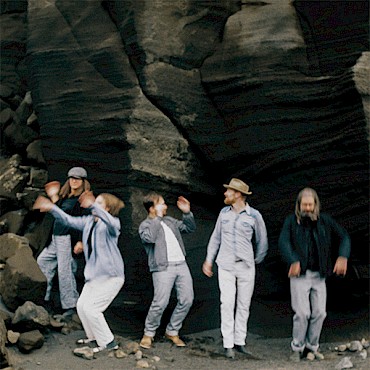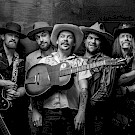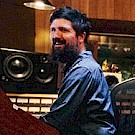 Photos by Kaja SigvaldaDuring a recent Fruition sound check at Bend’s Volcanic Theatre Pub, the five-piece Americana band ran through three new numbers—one from each of its principal songwriters and singers. For more than 15 years, Jay Cobb Anderson, Mimi Naja and Kellen Asebroek have been weaving their talents together, complementing each other’s melodic and lyrical ideas with vocal harmonies, fiery guitar solos, plucked mandolin strings and tickled ivories.
Photos by Kaja SigvaldaDuring a recent Fruition sound check at Bend’s Volcanic Theatre Pub, the five-piece Americana band ran through three new numbers—one from each of its principal songwriters and singers. For more than 15 years, Jay Cobb Anderson, Mimi Naja and Kellen Asebroek have been weaving their talents together, complementing each other’s melodic and lyrical ideas with vocal harmonies, fiery guitar solos, plucked mandolin strings and tickled ivories.
“It’s not hard for us to create and come up with music and arrange it on the road,” Anderson explains.
The ease with which they work is thanks to a common musical and creative language that’s been developed over almost two decades. It’s a boon for the string band that started busking on street corners in 2008 but has now spread out to disparate corners of this country as its sound has evolved. For years, the members of Fruition lived together—or just down the street from one another—in Portland, a place they still fondly claim.
Today, band members live in Atlanta, Brooklyn, Seattle, Pittsburgh and Vermont, a reality that’s “been a constant lesson and learning process of how to make it work,” Asebroek shares. There’s a weekly band call, “and for the most part, we have [tour] dates on the calendar that make it so that we’re never apart for too, too long.”
“When we used to all live in the same place, we would get off the road and kind of scatter, because we were just glued at the hip” and needed some personal space, Naja describes. “Now it kind of has that reverse psychology of when we’re apart, we’re fucking apart. I think that it enhances our togetherness.”
 Fruition is Tyler Thompson (drums), Jay Cobb Anderson (vocals, guitar, harmonica), Mimi Naja (vocals, guitar, piano, mandolin), Kellen Asebroek (vocals, guitar, piano) and Jeff Leonard (bass).Fruition is a band of songwriters who pen stick-in-your-head songs that fuse folk, rock, soul and pop elements. Featuring electric and acoustic guitars, Naja provides brilliant flashes of mandolin while Asebroek frequently mans the piano or organ and Anderson sometimes offers a touch of harmonica or pedal steel—and it’s all buttressed by the solid playing of bassist Jeff Leonard and drummer Tyler Thompson. Coupled with a spirited stage presence, the quintet has garnered a dedicated fan base who’ve dubbed themselves Fruity Freaks.
Fruition is Tyler Thompson (drums), Jay Cobb Anderson (vocals, guitar, harmonica), Mimi Naja (vocals, guitar, piano, mandolin), Kellen Asebroek (vocals, guitar, piano) and Jeff Leonard (bass).Fruition is a band of songwriters who pen stick-in-your-head songs that fuse folk, rock, soul and pop elements. Featuring electric and acoustic guitars, Naja provides brilliant flashes of mandolin while Asebroek frequently mans the piano or organ and Anderson sometimes offers a touch of harmonica or pedal steel—and it’s all buttressed by the solid playing of bassist Jeff Leonard and drummer Tyler Thompson. Coupled with a spirited stage presence, the quintet has garnered a dedicated fan base who’ve dubbed themselves Fruity Freaks.
After the pandemic, Fruition wasn’t necessarily sure what the future held for them. The trio hadn’t been “able to sing together for like a year during COVID,” Anderson says. He was in his own head, questioning if they still had anything to say. Then they got together and sang, and he immediately felt the connection.
“Not only does it feel comforting, like home, because we’re so used to each other, but the magic’s still there,” Anderson says.
Their musical connection supersedes challenges surrounding bicoastal logistics and general finances. The cost of everything—from touring expenses like travel and lodging to recording and releasing music—has increased of late.
“Despite the fact that venues are struggling, people are struggling [and] it’s harder to put on shows and it’s harder to afford shows, people are still connecting to our music,” Asebroek says. “That’s really motivating that songs, old songs and new songs, are resonating with people, and it feels like a disservice to not get out and sing and feel that vibe together, and then feel the energy exchange that happens between band and crowd. There’s few things that are like that that you can do in life.
“I think of being an artist is like real-life magic, because you’re able to create stuff out of thin air or grab the information that’s around you—emotions and feelings and stuff that’s happening on earth and in our country and whatever it is in your heart, in your life and your family. [The fact that] we can grab that stuff and make a piece of art out of it is fucking magical. That keeps me coming back every time.”
So, where do songs come from?
“Man, nobody knows. And if they did know, then we’d have problems. There’d be a fight over the well,” Anderson jokes.
“If you don’t actively have your antenna up to receive music and song ideas and inspiration, then they don’t fucking come,” Asebroek explains. “It’s really easy to be distracted,” whether by social media or the news, “and that’s when no songs come. But if you just have that antenna to receive that stuff, they just tend to pour in.” He adds, “Sometimes the only thing that’s stopping me is me.”
“I think one of the best things that will pause that whole mind frame is when you see something that inspires you—music, a movie, a photograph, a moment at a coffee shop,” Anderson says. “It’s a weird feeling. It’s almost like I can feel songs under my skin.”
Fruition’s catalogue is full of tunes that’ll transport you to places or moments of jubilation and sorrow. There’s plenty of love lost and won alongside drinking with your friends and reflecting on the meaning of life. The group’s latest album, 2024’s “How To Make Mistakes,” covers this familiar terrain, while on the recent single, the Hammond-laden rocker “Whole World of Trouble,” Anderson asks:
What are we doing to the earth?
What are we doing to each other?
If we don’t start stopping all the madness we’re making,
We’re headed for a whole world of trouble
“We’re never gonna make it if we keep seeing each other as separate rather than one people,” he writes in the track’s liner notes. “We are all human; and if we let politics, religion, class, -isms or pride divide us, we will self-destruct. Compromise, understanding and love is the only path to victory—or else we’re all headed for a whole world of trouble.”
“Real songs are the honest ones. So if you look at the world and you see no problem with it, then you’re gonna have nothing to say,” Anderson shares. “Part of being honest is talking about the hard shit.”
“Love is such a central part of the whole thing,” Asebroek continues, but it can manifest in a song in different ways, like “being frustrated at an oppressive government regime. The reason that you feel compelled to sing about that is because you love your brothers and sisters, and you don’t want people to be held down.”
There’s a lot in the world these days that “weighs heavily on our hearts,” Asebroek says. “The only way for it to weigh a little less is to share what you’re feeling and hope that it resonates with someone else. If it resonates with one other person, or if it helps shift someone’s narrow worldview a little bit wider and a little more accepting, then it was worth it.”
“We’re always evolving as humans, as a band and as a nation,” Naja says. Over time, they’ve learned to lean into these feelings and share their message through music.
“We live in this world, so our art is naturally going to speak on it,” she says. “And there’s no fear in feeling too radical in the face of extremism: There’s nothing radical about believing in human rights. There’s nothing radical about wanting humans to have housing, healthcare and autonomy. There’s nothing radical about not wanting to wake up to news of mass shootings in schools and malls and movie theaters. There’s nothing radical about denouncing military force coming for citizens demonstrating. There’s nothing radical about being a human that centers compassion and care. To us, it’s baseline normality. So, as artists, we don’t feel fear anymore about telling of what we see and how we feel about it. Because it shouldn’t be radical to care about each other.”
Once upon a time, playing music was Fruition’s sole focus; now there are marriages and kids in the picture. The distance between them means time spent together as a unit is more appreciated these days—“the presence is valued,” Naja says, because it’s harder to come by.
 Released in August 2024, "How To Make Mistakes" is Fruition's first studio album recorded completely live as a full band with no overdubs—watch the live studio takes below.The band might be the tightest, most congruous and mature that it’s ever been. It’s heard on the aptly titled “How To Make Mistakes,” the group’s only live studio album. Recorded as a full band in the studio with no overdubs, any sonic inconsistencies on the sentimental, less-is-more effort ring as authentic and honest, not jarring. Similarly cohesive, the energetic, 13-track “Live, Vol. 1,” recorded in Boise, Idaho, in 2019, documents the band’s rowdy performance prowess—listen below.
Released in August 2024, "How To Make Mistakes" is Fruition's first studio album recorded completely live as a full band with no overdubs—watch the live studio takes below.The band might be the tightest, most congruous and mature that it’s ever been. It’s heard on the aptly titled “How To Make Mistakes,” the group’s only live studio album. Recorded as a full band in the studio with no overdubs, any sonic inconsistencies on the sentimental, less-is-more effort ring as authentic and honest, not jarring. Similarly cohesive, the energetic, 13-track “Live, Vol. 1,” recorded in Boise, Idaho, in 2019, documents the band’s rowdy performance prowess—listen below.
The well is overflowing with another future release in the can as the band revisited Portland producer Tucker Martine (My Morning Jacket, The Decemberists, Modest Mouse, R.E.M.) at Flora Recording & Playback—where 2018’s rocking “Watching It All Fall Apart” was recorded. “I feel like it’s like the best stuff we’ve ever done,” Anderson notes. While figuring out when and how to put it out, Fruition has been road testing some of the tunes.
What about those three new songs (one of which features the opening line of “Fuck Elon Musk, Zuckerberg too”) from sound check? The group had never played them together before—sound check was more like band practice, and now “we’re gonna play [them] tonight,” Anderson says.
“Yeah, in like half an hour we have 15 minutes of new material, just ready,” Naja chimes in excitedly. “That’s fucking awesome.”
This ability to workshop songs in real time speaks to the whole group’s intrinsic comfort level with one another. On the new piece Anderson brought to the stage, he hashed out transitions with the rhythm section while the rest of the band learned the lyrics.
“I recognize that I’m spoiled with the way that we can just [say], ‘Here’s a new song. Here’s what I was thinking. Let’s try it out.’ And it’s fucking ready for the show. Like, that’s insane. That’s insane,” Naja emphasizes. “It’s still really special. World-class players don’t do that—just try it once and then play it [live] and it’s good!”
“That whole concept of trying something at the sound check and then playing it at the show, that’s another thing that keeps this full of life and keeps it interesting,” Asebroek adds. “Those moments where you’re on stage and there’s actually people watching, keeps you on edge. It keeps your ears wide open and really keeps you present. Like, ‘What’s the next chord?’ That kind of feeling is really exciting.”
This high-pressure skill honing keeps things fresh each night, but it also helps when the crowd’s reaction to multiple lyrics in Asebroek’s aforementioned “Untitled Resistance Song” is enthusiastic cheers—and it’s clear the closing line resonates: “Till everyone’s cared for, nobody is free.”
Fruition still has plenty more to say.









